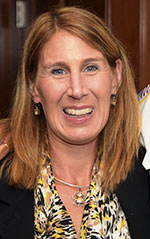The DS Melting Pot
The diversity of cultural backgrounds, experiences and language skills among DS ranks is a key to the bureau’s success in safeguarding U.S. diplomacy around the world.
BY RHONDA (RJ) BENT RABETSIVAHINY
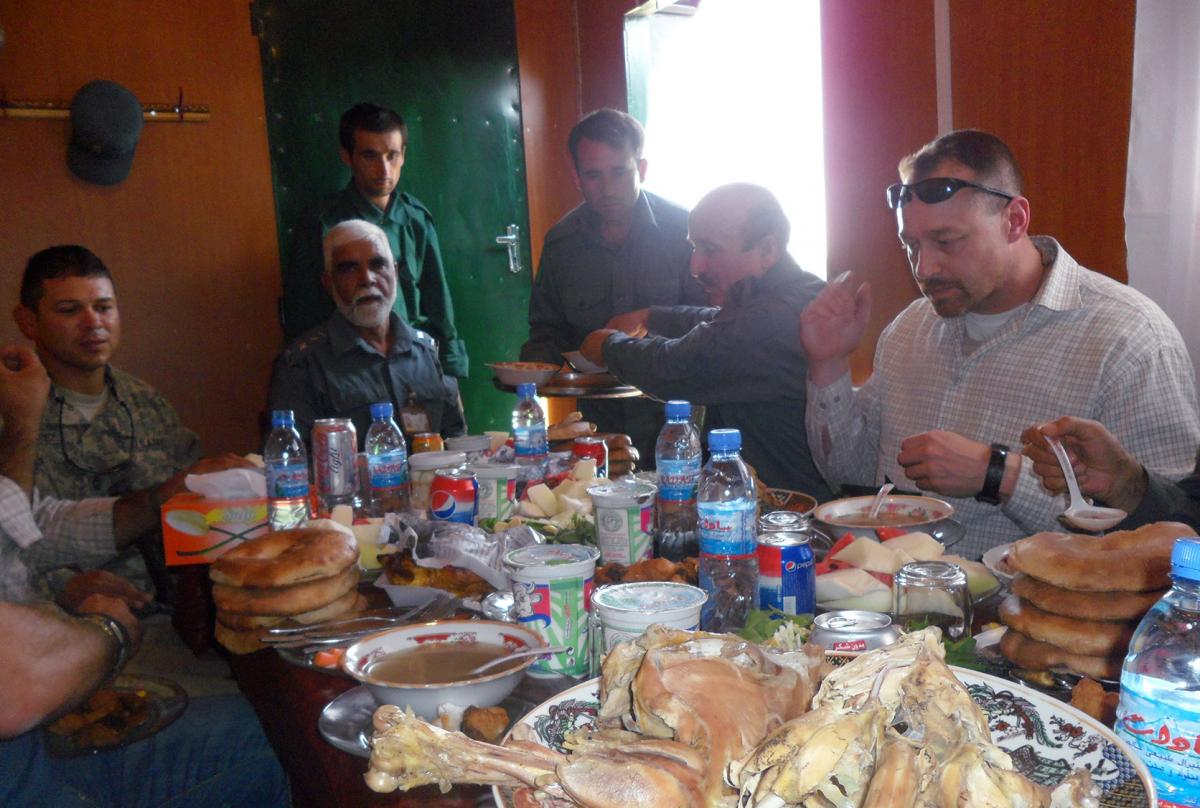
Christian Poulsen (seated at right) eats lunch with colleagues at one of the Afghan Public Protection Force regional training centers in Afghanistan.
Courtesy of Christian Poulsen

Wayne and Alicia May, and Emma MacNamara, the ambassador’s wife, pick up Brianna May from FANA (the Spanish acronym for the Foundation for the Assistance of Abandoned Children) Orphanage in Colombia on her adoption day.
Courtesy of Brianna May
In the U.S. law enforcement community, Diplomatic Security has a reputation for being a bit of a melting pot. Unlike other law enforcement agencies that hire for a narrowly defined skill set, DS needs and attracts people from a variety of backgrounds. Given the enormity of the DS mission—to provide a safe and secure environment for the conduct of U.S. foreign policy—as well as the geographic range of its responsibilities, DS special agents cannot easily be categorized. Although DS attracts large numbers of applicants with law enforcement or military backgrounds, agents come from diverse cultural backgrounds and bring a wide range of experience.
DS special agents must be truly dedicated to the job, and to their country. Therefore, one of the requirements is to hold U.S. citizenship. Within DS ranks, there are numerous agents who are immigrants or children of immigrants. Their multicultural backgrounds contribute to making DS a stronger, more dynamic organization. At the same time, the DS career path allows them to best utilize their rich cultural backgrounds, experiences and foreign language skills on a daily basis.
DS agent immigrants, or children of immigrants, came to the United States by many routes, and for many reasons. Some came as refugees; some were adopted by American families; some sought better opportunities. In other cases, their parents bravely made the sacrifices of immigrating in order to give their children a better life.
DS Stories
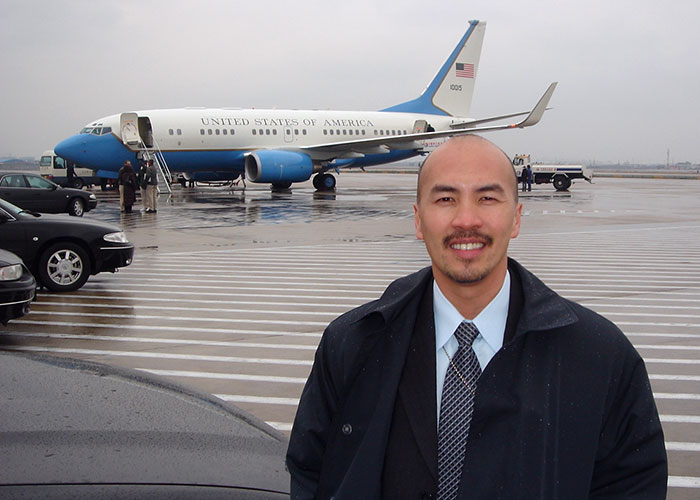
Special Agent Tony Hornik-Tran proudly serves his country as a member of the protective detail on a Secretary of State trip.
Courtesy of Tony Hornik-Tran
In May 1982, at the age of 15, Tony Hornik-Tran escaped from Vietnam, accompanied by his brother. The two sailed to the Philippines on a fishing boat. There he spent 11 months in refugee camps, finally making it to the United States, where he was adopted by an American family. In the span of just two decades, he went from being a refugee to a DS special agent and diplomat.
Brianna May was adopted from Colombia when she was 8 months old. Her father, then a DS agent, was serving there during the Pablo Escobar period. He and his wife were one of the first families to adopt a child from Colombia. May explains that both the U.S. ambassador and his wife were very involved in her adoption process. The ambassador’s wife even accompanied May’s parents to the orphanage to pick her up. “I thought the ambassador’s wife was actually my grandmother,” May says, because she was in all of the adoption-day photos.
In 1949, Christopher Gu’s maternal grandfather, who worked for a British shipping company, was at sea when the communists assumed control of China. Unable to return home, he eventually made it to New York City and began working in the restaurant business. In the 1970s, Gu’s grandfather and a few fellow shipmates opened the first Chinese restaurant in midtown Manhattan. It was he who petitioned for his grandson to leave Shanghai and immigrate to the United States. On May 4, 1983, Gu and his family started their new life in a small studio apartment in Elmhurst, New York. Gu still remembers how astonished he was back then by the abundance and choice offered in American grocery stores. In China, staples such as oil, salt and cooking oil were rationed, and eggs were only consumed on special occasions. Gu wasn’t accustomed to escalators, indoor plumbing or the luxury of hot tap water, either.
Pete Kapoukakis is the child of Greek immigrants. His father was a barber in Athens before he and his wife decided to journey to America to open their own business in the late 1960s. Neither of his parents spoke any English, nor did they have much money. They understood they would face significant obstacles, but were not deterred. They worked long hours and, eventually, their perseverance paid off. “They learned English, saved enough money to start a business, bought a house, had kids, sent them to college, helped plan two weddings, had grandkids and eventually retired to Florida—pretty much the American dream,” Kapoukakis recalls in an interview with the author.
Agents from all backgrounds have amazing stories to tell about their pathway to joining DS, but for immigrants, or children of immigrants, the stories are especially remarkable.
Diverse Paths to DS
Agents from all backgrounds have amazing stories to tell about their pathway to joining DS, but for immigrants, or children of immigrants, the stories are especially remarkable.
Christian Poulsen, born and raised in Denmark, was working at U.S. Embassy The Hague as an independent contractor. Intended to last three weeks, the assignment was converted into a program manager position that lasted two years. Poulsen’s DS colleagues noted his exceptional performance and strongly encouraged him to join DS. Poulsen discovered that in order to apply, he would need to acquire his undergraduate degree and convert his U.S. permanent residency into U.S. citizenship. Given the age restriction of 37 for applicants, Poulsen had just 2.5 years to accomplish these tasks.
During that time, he earned a degree (with honors), became a U.S. citizen, applied to DS and was hired. It was all worth it, Poulsen says, because his DS career offers him opportunities to “be a force for high safety and security standards for fellow Americans abroad.” He views DS as a “unique and incomparable agency,” where opportunities for personal and professional growth, meaningful impact and challenge are widely available.
In 1982, at the age of 19, Miguel Eversley emigrated from Panama to New York City and became a U.S. citizen six years later while serving in the U.S. Army. After fulfilling his obligation to the military, Eversley wanted to continue in public service; he joined the Washington, D.C., police department. While responding to a violent robbery, he encountered an Hispanic couple traumatized by the event. Eversley immediately switched to his native tongue, Spanish, which reassured and calmed them.
Afterward, to express their gratitude, the couple invited Eversley to their home for dinner. It was there that he met Foreign Service Officer Daniel Santos Jr., who happened to be the son of a famous Puerto Rican balladeer adored by the Eversley family. Santos described his career and sparked Eversley’s interest in Foreign Service life. By joining DS, Eversley discovered, he could continue his law enforcement career as a diplomat—the perfect combination for him.
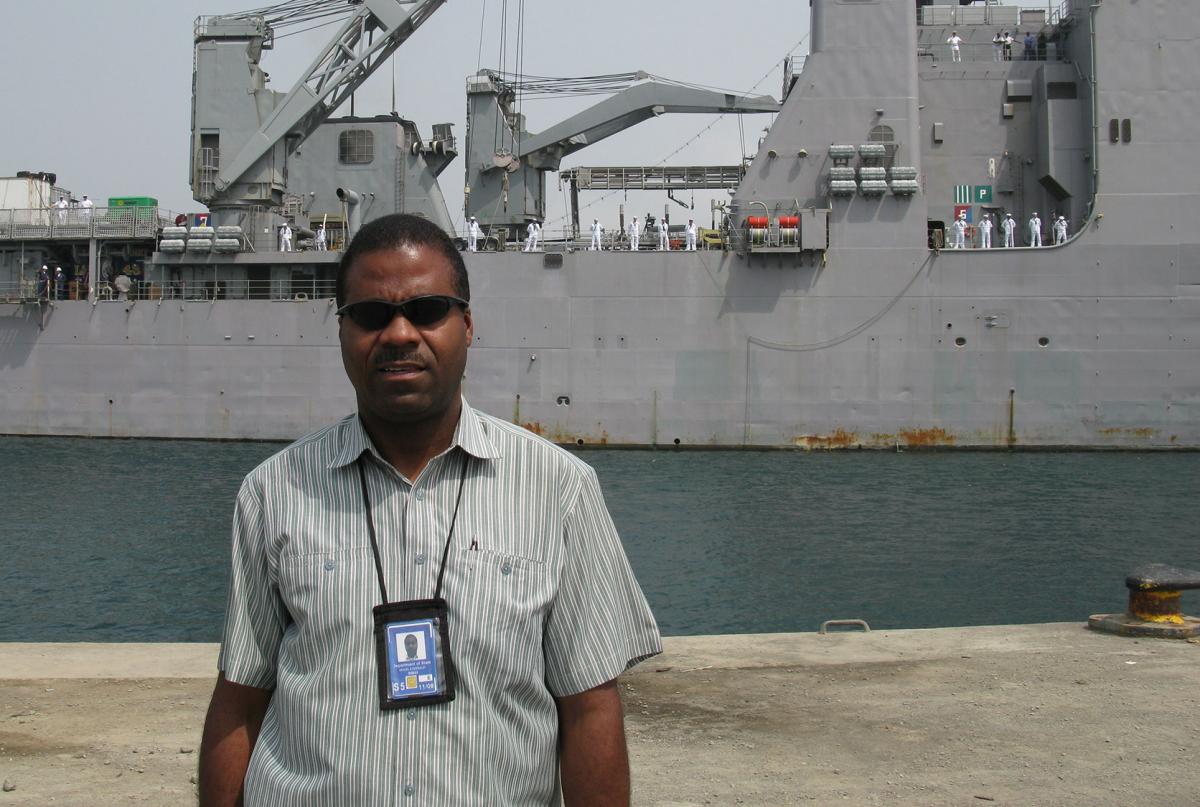
Miguel Eversley in 2006, providing security services to the U.S. Navy at Malabo, Equatorial Guinea.
Courtesy of Miguel Eversley
A Multiplicity of Skills
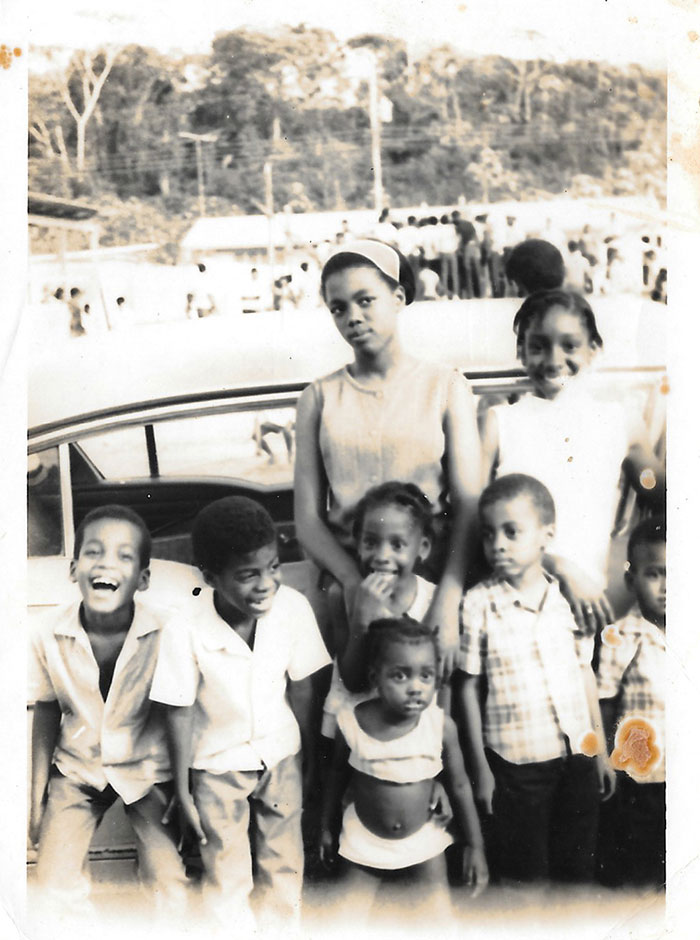
Miguel Eversley (second from left) as a child in Panama.
Courtesy of Miguel Eversley
Given the vast demands of the job, DS agents must come equipped with a variety of skills to be successful. During my own tenure with DS, I have often noted, and at times been envious of, the skills that DS agent immigrants or children of immigrants innately possess.
Eversley believes that his experience growing up poor in a developing country is advantageous when working in challenging overseas locations. “Little of what I experienced in Cameroon, Senegal, Nicaragua, Equatorial Guinea or any other of the developing countries where I served was surprising,” he says. “Having dinner at a Foreign Service National’s home, sitting on a cinder block while holding a plate and having a conversation was not new to me. Walking into a poor, crime-ridden neighborhood while conducting investigations does not make me uncomfortable. I feel camaraderie and kinship with people living in these conditions because I grew up the same way. This makes my work easier because I can gain the trust of those who are likely to provide information that could be beneficial to the embassy.”
Strong interpersonal skills are a hallmark of many DS agents, and especially agents with multicultural backgrounds.
Poulsen recalls that while he was working in Afghanistan, one of his local contacts was hospitalized. Having spent time gaining an understanding of Afghan etiquette in business and personal relationships, and recognizing the importance of his relationship with this person, he visited his contact in the hospital and brought him the requisite fruit basket, which further solidified their relationship. These efforts proved beneficial in many subsequent interactions, specifically when Poulsen leveraged his relationship to avoid a hasty, unanticipated effort on the part of the Afghan government to deport U.S. government personnel. Poulsen’s personal approach to diplomacy and many of his accomplishments reflect traditional Danish qualities, but his work ethic and ambition are all-American.
Sometimes the examples set forth by one’s parents are as significant as personal experience. Kapoukakis credits his parents’ determination and resourcefulness with showing him that he could overcome anything with a positive mindset, hard work and tenacity. “I grew up with living, breathing examples of two people who didn’t take no for an answer; two people who came to the United States with nothing, made something of themselves and became contributors to the society that gave them the opportunity to succeed,” he says. “That taught me a lot about how to approach and overcome challenges.” For Kapoukakis, the prevailing mindset while facing adversity growing up was “we’ll figure it out.” He’s carried those lessons with him through his two decades of public service.
Many of us aspire to be polyglots, yet struggle to pass the Foreign Service Institute’s language exams. But for many DS agents, understanding multiple languages is the norm. In addition to English, Special Agent Hornik-Tran speaks six languages: fluent Vietnamese, good Chinese and decent Slovak, as well as French, Portuguese and Tagalog. Likewise, Teji Thiara, the child of Indian immigrants, grew up speaking English and her parents’ native tongue, Punjabi. She later picked up Hindi while attending boarding school in India. As the child of farmers in northern California, Thiara grew up hearing and speaking Spanish. Add a few overseas tours, and she solidified her Spanish and also picked up a little Czech.
A common theme with all of these agents is their call to public service.
Themistocles (Themi) Karavites played a crucial role in security operations for the U.S. Olympic team at the 2004 Athens Olympics. As an assistant regional security officer in Athens, he served as one of four regional security coordinators and the protective detail lead for all U.S. delegations. He is frequently selected to serve on Greek protective details because of his language abilities.
This language ability, combined with his Greek heritage and cultural expertise, paid unexpected dividends during his tour in Belgrade, where Karavites discovered that several of the RSO’s primary police contacts had previously served in Greece and also spoke Greek. Because of the Serbian affinity for Greek culture and similarity in religions, Karavites gained immediate acceptance there, fostering much closer and personal relationships in all of his interactions. His work in Serbia is an exceptional example of cooperation between the RSO and his or her host-nation counterparts.
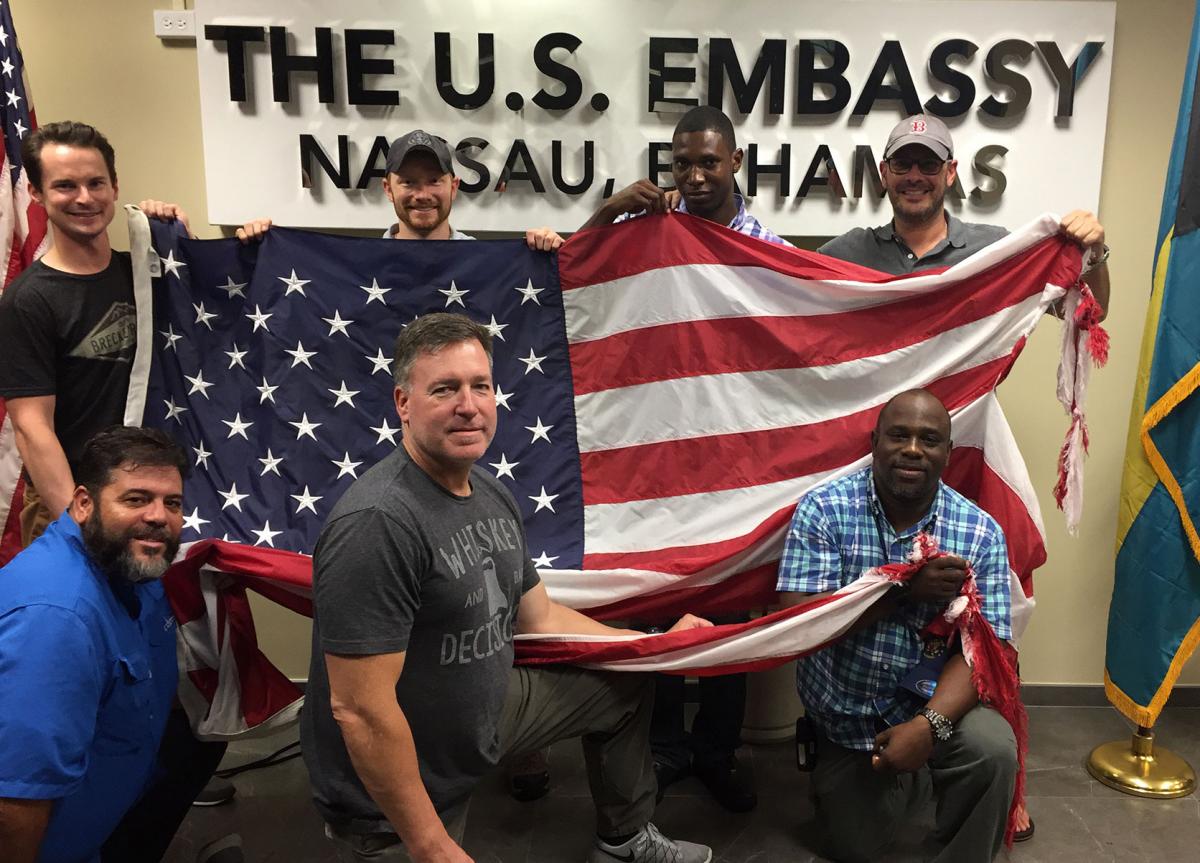
This flag was recovered from the ambassador’s residence in Nassau during the height of last year’s Hurricane Matthew. As the category 5 winds blew at over 130 mph, RSO staff risked their safety to lower and protect the flag. It is now proudly displayed in the Regional Security Office at Embassy Nassau as a reminder that no matter how prepared you think you are, there’s always something you hadn’t thought of.
Counterclockwise from top right: RSO Nassau Pete Kapoukakis, Executive Bodyguard Ashton Stubbs, DS SA John Wharton (TDY during Hurricane Matthew from Atlanta), Nassau ARSO Kyle Pusch, Executive Bodyguard Gerry Oldham, DS SSA Michael Murphy (TDY from Atlanta) and Executive Bodyguard Andy Sands.
Embassy Nassau
A Common Theme
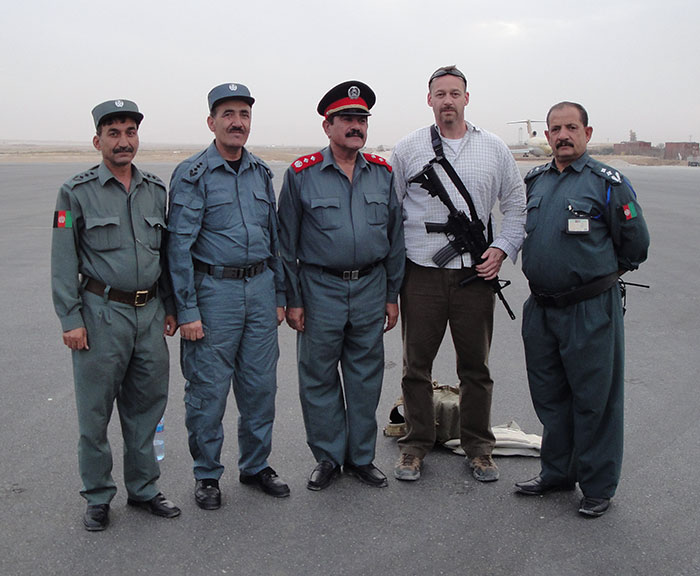
Special Agent Christian Poulsen (second from right) stands with BG Sadat and his staff after a joint trip assessing Afghan Public Protection Force regional training centers throughout Afghanistan.
Courtesy of Christian Poulsen
A common theme among all of these agents is their call to public service. For Hornik-Tran, the seeds of service were planted by the international organization workers who helped him in the refugee camps. He was deeply moved by their generosity, commitment and dedication, and he promised himself that he, too, would someday serve others. DS afforded him the opportunity to fulfill that dream. “Working for DS has allowed me to have an awesome opportunity to travel around the world, meet interesting people and, last but not least, exchange my success story as a former refugee from Vietnam who achieved the American dream,” says Tran.
May, who grew up living the FS life, explained that in her childhood, she was always surrounded by members of the Foreign Service. She considers many of them her extended family, and says they shaped her life, direction and career choice. May was drawn to join DS ranks, deciding to follow in her father’s footsteps to serve as a DS agent. May hopes one day to be assigned to Colombia, where she can fulfill her lifelong goal of adopting a child from the orphanage from which she was adopted.
After joining the Marine Corps Reserves during his junior year of high school, Christopher Gu’s heartfelt dedication to the United States grew, as did his desire to serve. Fortuitously, his reserve unit included an active DS agent, Pat Moore, who told him about the Bureau of Diplomatic Security. In China, being a law enforcement officer is considered prestigious, and Gu describes how when he joined the Foreign Service as a DS agent, his parents were “immensely proud”—despite the fact that living away from one’s aging parents was contrary to Chinese tradition.
Gu recalls that while waiting in China for his immigration paperwork to be processed, his classmates learned of his departure plans and accused him of betraying his country. In the United States Gu is labeled “Chinese-American”; in China, he would no longer be viewed as 100-percent Chinese either. Although culturally he sees himself somewhere in the middle, his dedication to the United States and its ideals is unquestionable. “The greatest thing about the United States is our diversity,” he says. “We can either use it to unite us or allow it to divide us.” This holds true within DS, as well.
Finally, on a personal note, my husband is originally from Madagascar and has since become a naturalized U.S. citizen, making our daughter the child of an immigrant as well as a diplo-kid. At the age of 5, her passport bears stamps from eight countries (some multiple times), she’s been exposed to four languages and her adaptability far exceeds her years. I hope that someday she, too, will answer the call to serve her country and, selfishly perhaps, I hope that she, too, will proudly carry the DS badge.

